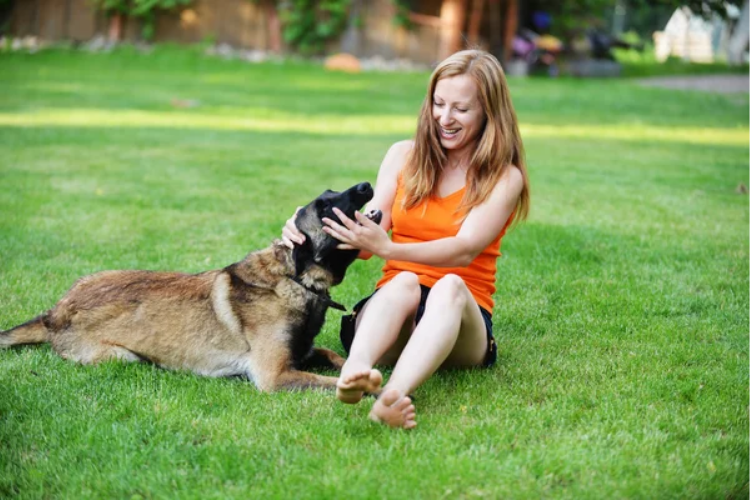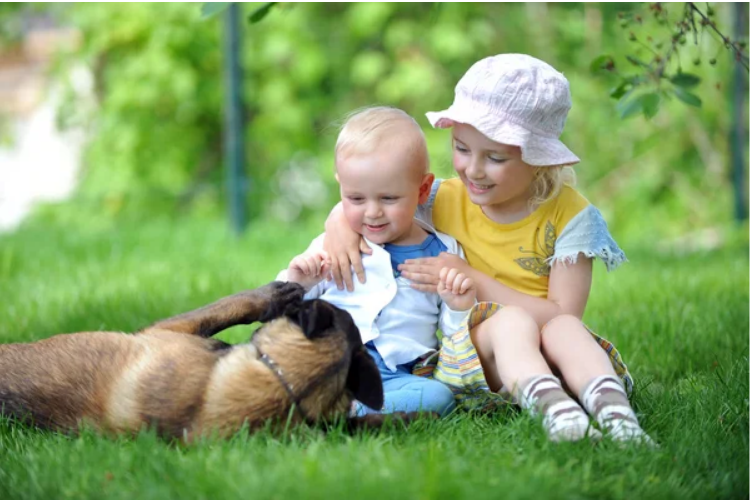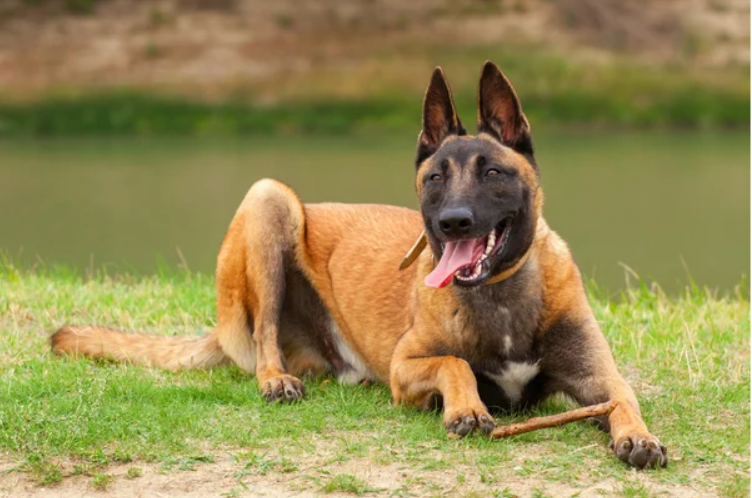
Ensuring the safety and security of our families has become a top priority for many households. While there are various methods to protect our loved ones, one time-tested solution stands out: family protection dogs. These loyal canines not only offer companionship but also serve as vigilant guardians for our homes and children. As the demand for family protection dogs for sale continues to rise, it’s crucial to understand which breeds are best suited for this important role.
In this guide, we’ll explore the top seven family protection dogs that excel in guarding your home and children. We’ll delve into their unique characteristics, training requirements, and suitability for family life. Whether you’re considering a German Shepherd protection dog or exploring other trained protection dogs for sale, this article will provide valuable insights to help you make an informed decision.
What Makes a Good Family Guard Dog?
Before we dive into our list of the best family protection dogs, it’s essential to understand what qualities make a canine an effective guardian for your home and children. The ideal family guard dog should possess a combination of traits that balance protection with gentle companionship.
Here are some key characteristics to look for:
- Loyalty: A strong bond with family members is crucial for a protection dog.
- Intelligence: The ability to assess situations and respond appropriately is vital.
- Trainability: A good guard dog should be receptive to commands and ongoing training.
- Alertness: Keen senses and the ability to detect potential threats are essential.
- Temperament: A balanced personality that is gentle with family but protective when necessary.
- Size and strength: Adequate physical presence to deter intruders.
- Energy level: Sufficient stamina to patrol and protect the property.
The Importance of Proper Training
While certain breeds may have natural guarding instincts, proper training is crucial for developing a reliable family protection dog. Professional training can help channel a dog’s protective instincts in a controlled manner, ensuring they respond appropriately to perceived threats without becoming overly aggressive.
Top 7 Family Protection Dogs

Now that we’ve established the qualities of a good family guard dog, let’s explore the top seven breeds that excel in this role:
1. German Shepherd: The All-Round Protector
The German Shepherd has long been revered as one of the most versatile working dogs in the world. Originally bred in Germany in the late 19th century for herding sheep, these intelligent canines quickly gained recognition for their exceptional abilities in various roles, including police work, search and rescue, and of course, as family protection dogs.
Key Characteristics
- Intelligence: German Shepherds are renowned for their high intelligence, making them quick learners and adept problem-solvers.
- Loyalty: They form strong bonds with their families and are fiercely protective of their loved ones.
- Versatility: These dogs excel in various tasks, from obedience to protection work.
- Physical prowess: With a strong, athletic build, German Shepherds have the strength and agility to deter threats effectively.
Suitability for Family Protection
The German Shepherd protection dog is an excellent choice for families seeking a devoted guardian. Their natural protective instincts, combined with their trainability, make them ideal for home security. However, it’s important to note that early socialization and consistent training are crucial to ensure they remain well-balanced and don’t become overly protective.
2. Belgian Malinois: The Tireless Protector
Originating from Belgium, the Belgian Malinois was initially bred as a herding dog. However, their intelligence, agility, and work ethic have made them popular choices for police and military work, as well as family protection.
Key Characteristics
- Energy: Belgian Malinois are known for their high energy levels and tireless work ethic.
- Intelligence: They are quick learners and excel in various types of training.
- Loyalty: These dogs form strong bonds with their families and are naturally protective.
- Agility: Their athletic build allows them to respond quickly to potential threats.
Suitability for Family Protection
For active families who can provide ample exercise and mental stimulation, the Belgian Malinois can be an exceptional family protection dog. Their keen intelligence and trainability make them highly effective guardians. However, their high energy levels and strong work drive mean they’re best suited to experienced dog owners who can provide consistent training and engagement.
3. Rottweiler: The Powerful Guardian
Rottweilers have a rich history dating back to the Roman Empire, where they were used as herding dogs and to pull carts for butchers. Over time, they evolved into formidable guard dogs, known for their strength and unwavering loyalty.
Key Characteristics
- Strength: Rottweilers boast an impressive physique, making them a powerful deterrent to potential intruders.
- Confidence: These dogs exude a natural confidence that commands respect.
- Loyalty: They are deeply devoted to their families and will go to great lengths to protect them.
- Intelligence: Rottweilers are quick learners and respond well to consistent training.
Suitability for Family Protection
When properly trained and socialized, Rottweilers can be excellent family protection dogs. Their imposing presence alone can deter many threats, while their gentle nature with family members makes them suitable for households with children. However, due to their strength, early training and socialization are essential to ensure they remain well-mannered and obedient.
4. Doberman Pinscher: The Sleek Sentinel
Developed in Germany in the late 19th century by Karl Friedrich Louis Dobermann, the Doberman Pinscher was specifically bred to be the ideal protection dog. Combining various breeds, Dobermann created a dog with intelligence, strength, and loyalty.
Key Characteristics
- Alertness: Dobermans are known for their keen senses and ability to quickly detect potential threats.
- Speed and agility: Their sleek, muscular build allows for quick responses to dangerous situations.
- Intelligence: Consistently ranked among the most intelligent dog breeds, Dobermans excel in training.
- Loyalty: They form strong bonds with their families and are naturally protective.
Suitability for Family Protection
Doberman Pinschers are excellent choices for families seeking a vigilant and trainable protection dog. Their combination of intelligence, loyalty, and physical capabilities makes them formidable guardians. However, their high energy levels mean they require plenty of exercise and mental stimulation to thrive in a family environment.
5. Bullmastiff: The Gentle Giant
Developed in England in the 19th century, the Bullmastiff was created by crossing Bulldogs with Mastiffs. Their primary purpose was to guard estates against poachers, using their size and strength to pin down intruders without causing severe harm.
Key Characteristics
- Size: Bullmastiffs are large dogs with an imposing presence that can deter potential threats.
- Loyalty: They are deeply devoted to their families and naturally protective.
- Calmness: Despite their size, Bullmastiffs are known for their gentle and calm demeanor.
- Strength: Their powerful build makes them effective in physical confrontations if necessary.
Suitability for Family Protection
Bullmastiffs can be excellent family protection dogs, especially for those seeking a more laid-back guardian. Their natural protective instincts, combined with their gentle nature around family members, make them suitable for households with children. However, due to their size, early training and socialization are crucial to ensure they remain manageable and well-behaved.
6. Giant Schnauzer: The Versatile Defender
Originating from Germany, the Giant Schnauzer was initially bred as a multi-purpose farm dog, capable of herding livestock and guarding property. Their intelligence and versatility have since made them popular choices for police work and family protection.
Key Characteristics
- Intelligence: Giant Schnauzers are highly intelligent and quick to learn new commands.
- Alertness: They have a natural watchdog instinct and are quick to alert their families to potential threats.
- Strength: Despite not being as large as some other protection breeds, Giant Schnauzers are strong and capable defenders.
- Versatility: These dogs excel in various roles, from companionship to protection work.
Suitability for Family Protection
Giant Schnauzers can make excellent family protection dogs for active households. Their intelligence and trainability allow them to excel in various protection scenarios, while their playful nature makes them suitable companions for families with children. However, they require consistent training and plenty of mental and physical stimulation to thrive.
7. Cane Corso: The Italian Powerhouse
The Cane Corso, also known as the Italian Mastiff, has ancient roots tracing back to Roman times. Originally used as a war dog and later as a guardian of property and livestock, this breed has a long history of protection work.
Key Characteristics
- Strength: Cane Corso’s are powerfully built dogs with impressive physical capabilities.
- Loyalty: They are deeply devoted to their families and naturally protective.
- Intelligence: While not as easily trainable as some breeds, Cane Corso’s are intelligent and can learn complex tasks with consistent training.
- Calmness: Despite their imposing appearance, they are often calm and gentle with family members.
Suitability for Family Protection
For families seeking a strong and loyal protector, the Cane Corso can be an excellent choice. Their natural guarding instincts and impressive physical presence make them effective deterrents against potential threats. However, due to their size and strength, early socialization and consistent training are essential to ensure they remain well-mannered and obedient in a family setting.
Why Choose a Belgian Malinois or German Shepherd as a Family Guard Dog?

When it comes to guard dog breeds that excel as family guard dogs, the Belgian Malinois and German Shepherd consistently rise to the top. But what is it about these herding breeds that make them such effective protectors and family companions? Here are some key reasons:
- Loyalty and devotion: Both Malinois and German Shepherds are known for forming incredibly strong bonds with their families. They have an innate desire to protect their pack and will put themselves in harm’s way to keep loved ones safe.
- Highly intelligent: These dogs are among the smartest breeds, making them highly responsive to training. They excel at learning complex tasks and commands, which is essential for a well-trained family guard dog.
- Trainability: In addition to being smart, Malinois and German Shepherds are also highly trainable. They are eager to please their owners and have a strong work ethic, making them a joy to train for various roles.
- Alertness and vigilance: With their keen senses and natural wariness of strangers, these breeds stay alert and vigilant in guarding the home and family. They are quick to sound the alarm if they sense an intruder or threat.
- Stable temperament: When bred and raised responsibly, Malinois and German Shepherds have a stable, even temperament. They are self-assured, fearless when needed, but not unnecessarily aggressive or highly-strung.
- Athleticism: Both breeds have strong, athletic builds that allow them to be active protectors. They have impressive speed, agility, and endurance – important qualities in a guard dog.
- Intimidating presence: The mere presence of a Malinois or German Shepherd is often enough to deter would-be intruders. Their confident demeanor, muscular build, and intense stare project an intimidating image.
- Affectionate and gentle: Despite their protective nature, these breeds are also known for being incredibly affectionate and gentle with their families, especially children. With proper socialization, they can be patient, nurturing playmates.
The Importance of Professional Training
When it comes to family protection dogs, professional training is not just beneficial – it’s essential. Trained protection dogs for sale often command higher prices, but the investment is well worth it for the safety and peace of mind they provide. Professional trainers can help develop a dog’s natural protective instincts while ensuring they remain well-behaved and responsive to commands.
Key aspects of professional protection dog training include:
- Obedience training: Ensuring the dog responds promptly to basic and advanced commands.
- Threat assessment: Teaching the dog to differentiate between genuine threats and normal situations.
- Controlled aggression: Training the dog to respond appropriately to threats without becoming overly aggressive.
- Family integration: Helping the dog understand its role within the family unit and how to interact safely with all members, especially children.
Socialization: Creating a Well-Rounded Guardian
Proper socialization is crucial for developing a balanced family protection dog. Exposing your canine companion to various people, animals, and situations from an early age helps prevent fear-based aggression and ensures they can distinguish between normal interactions and potential threats.
Effective socialization techniques include:
- Positive exposure to different people, including children, elderly, and individuals with disabilities.
- Controlled interactions with other animals, both dogs and other species.
- Exposure to various environments, such as busy streets, parks, and different weather conditions.
- Familiarization with common household sounds and activities.
Living with a Family Protection Dog
Bringing a protection dog into your home requires careful consideration and preparation. Here are some tips for successfully integrating your new guardian into family life:
- Establish clear rules and boundaries from the start.
- Involve all family members in training sessions to reinforce the dog’s role in the family unit.
- Provide ample opportunities for exercise and mental stimulation.
- Create a designated space for the dog to retreat when needed.
- Maintain consistent routines for feeding, exercise, and training.
Safety Considerations for Children
While family protection dogs can be excellent companions for children, it’s crucial to establish and enforce safety guidelines:
- Teach children to respect the dog’s space and not disturb them while eating or sleeping.
- Supervise all interactions between young children and the dog.
- Educate children about the dog’s training commands and when to use them.
- Establish a safe word or signal for children to use if they feel uncomfortable or threatened in any situation.
The Ethics of Owning a Protection Dog
Owning a family protection dog comes with significant responsibilities. As guardians of these powerful animals, we must ensure they are well-cared for, properly trained, and never used irresponsibly. This includes:
- Providing regular veterinary care and maintaining up-to-date vaccinations.
- Ensuring the dog receives ongoing training and mental stimulation.
- Adhering to local laws regarding dog ownership and control.
- Never encouraging or rewarding unnecessary aggression.
Building Trust and Bonds
Trusting protection dogs is essential for their effectiveness and the harmony of your household. Building a strong bond with your canine guardian involves:
- Spending quality time together through play and training sessions.
- Providing consistent leadership and clear communication.
- Respecting the dog’s needs for rest and personal space.
- Offering positive reinforcement for good behavior and successful protection work.
Choosing the Right Guardian for Your Family
Selecting the best family protection dog is a significant decision that requires careful consideration of various factors, including your lifestyle, family dynamics, and specific security needs. While we’ve explored seven excellent breeds known for their guarding abilities, it’s important to remember that individual dogs within each breed can vary in temperament and suitability.
When choosing a family protection dog, consider the following:
- Assess your family’s activity level and ability to meet the dog’s exercise needs.
- Evaluate your experience with dog ownership and training.
- Consider the size of your living space and any breed restrictions in your area.
- Think about the specific security concerns you want to address.
- Consult with professional trainers or breeders specializing in protection dogs.
Remember, the best guard dogs are not just powerful protectors but also loving family members. The ideal family guard dog should seamlessly transition between its protective role and that of a gentle companion. By choosing the right breed, investing in proper training, and providing a loving home, you can enjoy the peace of mind that comes with having a loyal canine guardian while enriching your family life with a devoted four-legged friend.
Whether you opt for a German Shepherd protection dog, a gentle giant like the Bullmastiff, or any of the other breeds we’ve discussed, the key to success lies in commitment, proper training, and mutual respect between you and your canine protector. With the right approach, your family protection dog will not only guard your home and children but also become an integral part of your family, offering unwavering loyalty, companionship, and security for years to come.
Experience the Scott’s K9 difference for yourself – call us at (919) 939-6003 to discuss your protection dog needs and schedule a visit to our facility.